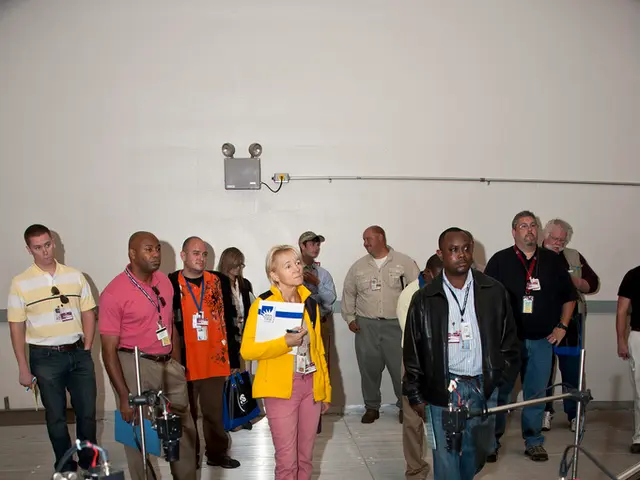Displaced cyber trafficking survivors from Southeast Asia revived from their ordeals, yet distant from their homelands
Vicious Cyber-Scam Operations Plague Southeast Asia
A wave of cyber-crime scam compounds has swept through Southeast Asia, trapping thousands in a vicious cycle of exploitation and abuse, largely spurred by the COVID-19 pandemic. Founder of the Thailand-based Immanuel Foundation, Jaruwat Jinnmonca, now dedicates most of his time to assisting these victims.
Visuals of Brutality: Hundreds of Thousands Entrapped in Southeast Asia's Dark Web
The United Nations has identified over 300,000 trapped victims in these scam compounds, with reports indicating harsh living conditions. Jaruwat's phone showcases horrific images: victims with purplish bruises, bleeding wounds, and even the lifeless body of someone brutally beaten or dead. In 2023 alone, he has received reports of seven murdered victims within these compounds and multiple suicide attempts by exhausted workers left waiting for aid that never comes.
"They yearn to return home," Jaruwat confides, "If they don't comply with orders, the gang leaders will torment them until they cease to breathe. Some, when they can't escape, they jump off from the seventh or tenth floor. They wish to die."
Lured by False Promises
Enticed by economic vulnerabilities caused by the pandemic, these scam operations attract victims from diverse backgrounds, with some traveling as far as Ethiopia and India under false pretenses of well-paid jobs in Thailand. Instead, they spend their days tethered to technology, devising fake social media profiles and fabricated stories to trick innocent people out of their hard-earned money, contributing to a 2023 cyber-crime economy that was responsible for $8 trillion in losses.
Joint Rescue Operation
In February, Myanmar authorities, under pressure from China following the trafficking of a Chinese actor, Wang Xing, collaborated with the Thai government to launch the largest rescue operation yet. Shutting down the internet and interrupting fuel supplies and electricity in Myawaddy, Myanmar, authorities managed to cripple several compounds, freeing over 7,000 workers.
Aftershock: Where Do They Go From Here?
The struggle for these survivors, however, is far from over. Many are now housed in holding centers, waiting for repatriation, but face scarcities in food, medicine, and other essentials.
The Immanuel Foundation's Rescue Operations
The Immanuel Foundation has rescued over 2,700 individuals since 2020. Upon rescues, Jaruwat's team provides medical attention, involves law enforcement, and contacts their respective embassies or organizations to help facilitate their safe return. In bustling periods, his phone vibrates every few minutes with alerts of successful rescues and trapped individuals requesting assistance.
Targeting the Top: Eliminating Cyber-Scam Compounds
Jaruwat believes that arresting the masterminds at the head of these operations is the key to preventing trafficking and these scams. "If we don't address this issue, it will only escalate," he explains. Instead, authorities often target the workers, risking further imprisonment for victims rescued from one country in another.
Help on the Horizon?
Coordinating cross-border rescue efforts is tough, as victims face numerous barriers en route to safety, such as trauma, legal complexities, and insufficient resources. Amy Miller, regional director for Southeast Asia at Acts of Mercy International, expressed concerns about the slow pace of repatriation:
"They complain about the wait times," Miller says. "There are sick people who might not be receiving treatment. It's a ticking time bomb ready to explode."
The continued operation of these scam compounds remains questionable, as stronger international coordination and resouces would be crucial for successful dismantlement and support for victims.
Sources:
- Migrant workers at center of Southeast Asian cyber scams face life of abuse
- Southeast Asia's Online Scam Compounds Pose Growing Human Trafficking Concerns
- Cybercrime: A $7.5 trillion threat to the global economy, UN report says
- Singapore authorities arrest 65, dismantle China-linked romance scam syndicate
- Calls for regional action to protect Southeast Asian migrant workers targeted by cyber scams
- The sheer magnitude of these cyber-scam operations, as highlighted by the United Nations, who identified over 300,000 trapped victims in Southeast Asia, underscores the urgent need for technology and cybersecurity advancements to combat this crime-and-justice issue.
- As the Immanuel Foundation continues to rescue victims of these cyber-scams, it becomes increasingly apparent that addressing the general-news issue of the vicious cycle of exploitation and abuse requires not only rescuing efforts but also a focus on eliminating the cyber-scam compounds by targeting and apprehending the masterminds behind these operations.








